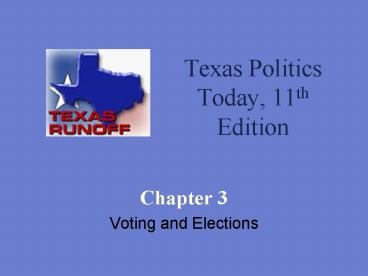Texas Politics Today, 11th Edition - PowerPoint PPT Presentation
1 / 19
Title:
Texas Politics Today, 11th Edition
Description:
Cannot have been declared mentally incompetent by the court 'a convicted felon whose rights have not been restored by a pardon or by the ... – PowerPoint PPT presentation
Number of Views:80
Avg rating:3.0/5.0
Title: Texas Politics Today, 11th Edition
1
Texas Politics Today, 11th Edition
- Chapter 3
- Voting and Elections
2
Political Participation
- People participate in many ways
- Voting
- Discussion
- Campaigning
- Donating money
- Signs
- groups
3
The Participation Paradox
- People should not vote
- People vote for many other reasons
4
Who Votes?
- Demographic Variables
- Education
- Age
- Income
- Political Variables
- Interest
- Party identification
5
The Practice of Voting
- A U.S. citizen
- At least eighteen years of age
- A resident of the state and a county
- Cannot have been declared mentally incompetent by
the court - a convicted felon whose rights have not been
restored by a pardon or by the passage of two
calendar years from the completion of a
sentence. - Must register by person or mail thirty days
before the election - May register while getting a drivers license
6
Voter Turnout in U.S. and Texas
7
Voter Turnout (Continued)
- Voting age population has increased at a rate
twice of that of the total electorate. - Reasons for low voter turnout in America
- Twenty-sixth Amendment
- Decline in Party Identification
- Voting for presidential elections has gone down
in America. - Turnout in general elections is generally lower
than those of most industrialized democracies of
the world. - Turnout in Texas has remained stable, but is only
about 26.
8
Reasons for low voter turnout in Texas
- Legal Constraints
- Socioeconomic Factors
- Political Structure
- Political Culture
- Poll Tax
- Womans Suffrage
- White Primary
- Military Vote
- Long Residency Requirement
- Property Ownership for Bond Elections
- Annual Registration
- Early Registration
- Jury Duty
9
Socioeconomic Factors
- Texas Poverty Level is 15.
- 3 of 10 minorities live at the poverty level.
- 1 0f 5 Texans over 25 did not graduate from high
school42 - Thus, a positive correlation exists between
income, education and voting.
10
Political Structure
- The long ballot is used with 150 to 200
candidates names. - Voters are asked to vote at numerous elections
for boards, municipalities and bonds. - The present system is just as modern as other
systems in the country.
11
Political Culture
- Texas is a mix of the traditionalistic and
individualistic culture. - Traditionalistic
- Individualistic
12
Voting Barriers Removed
- The 26th Amendment
- The Voting Rights Act of 1965
- Removing property requirements
13
Elections in Texas
- Direct Primaries are a by product of the caucus
and the party convention system. - Once considered private parties or individuals,
the primary system was argued in court. - Smith v. Allwright (1944) invalidated primaries
as a private process and invalidated the the all
white primary.
14
Elections in Texas (cont.)
- Major parties must hold a primary.
- Minor a parties are allowed to hold conventions.
- Financing of primaries is by the Secretary of
State, the chief elections officer for the state
state and county executive committees are
reimbursed. - Writes-in candidates are also allowed 5000
signatures for state-wide offices/district and
lesser offices 500 maximum.
15
County State Elections
- County Elections
- Chair and county executive committee administer
primaries - State Elections
- State party chair and executive committee
administer primaries - Run-offs are held when no candidate receives a
majority of the popular vote.
16
Primaries are Open or Closed
- Closed Primary
- A person is forbidden to vote in more than one
primary on election day - Once a person has voted in the first primary,
they are forbidden from voting in the other
parties run-off and convention
- Open Primary
- Voters decide on election day in which primary
they will participate - In Texas to win a primary requires a majority of
those who vote.
17
When are Closed or Open Primaries Used?
- A closed primary is one in which only registered
party members can vote. - Texas operates in practice like an open primary.
- In Texas, the legal system is a closed primary.
- Crossover voting allows members of one party to
raid the other partys primary. - Texas nominates party candidates via direct
primary. - The dual primary sometimes results in a run-off.
- Texas first direct primary law was the Terrell
Election Law of 1903.
18
General Elections
- Held biennially on the first Tuesday after the
first Monday of even-numbered years. - The primary winners run in the general election.
- To win a general election, a candidate must
receive a plurality. - County officials conduct general elections.
- Special elections meet emergencies for home-rule
cities, the US and state legislatures. - They are not partisan.
- It is easy to get on the ballot. Fill the forms
and pay the filing fee.
19
Ballots
- Requiring ballots to be printed in English and
Spanish allows more citizens to vote as enacted
by the legislature in 1975. - 40 of those under twenty five vote in national
elections. - In Texas, we use the party column ballot which
encourages straight ticket voting. - The secret ballot is an Australian Ballot.































